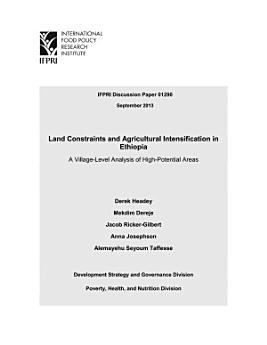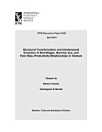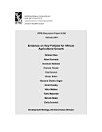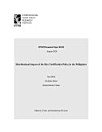Land Constraints and Agricultural Intensification in Ethiopia: A Village-Level Analysis of High-Potential Areas
Derek Headey · Mekdim Dereje · Jacob Ricker-Gilbert · Anna Josephson · Alemayehu Seyoum Taffesse
sept 2013 · IFPRI Discussion Paper Libro 1 · Intl Food Policy Res Inst
5,0star
1 reseñareport
eBook
40
Páginas
family_home
Apto
info
reportLas valoraciones y las reseñas no se verifican. Más información
Información sobre este eBook
Highland Ethiopia is one of the most densely populated regions of Africa and has long been associated with both Malthusian disasters and Boserupian agricultural intensification. This paper explores the race between these two countervailing forces, with the goal of informing two important policy questions. First, how do rural Ethiopians adapt to land constraints? And second, do land constraints significantly influence welfare outcomes in rural Ethiopia? To answer these questions we use a recent household survey of high-potential areas. We first show that farm sizes are generally very small in the Ethiopian highlands and declining over time, with young rural households facing particularly severe land constraints. We then ask whether smaller and declining farm sizes are inducing agricultural intensification, and if so, how. We find strong evidence in favor of the Boserupian hypothesis that land-constrained villages typically use significantly more purchased input costs per hectare and more family labor, and achieve higher maize and teff yields and high gross income per hectare. However, although these higher inputs raise gross revenue, we find no substantial impact of greater land constraints on net farm income per hectare once family labor costs are accounted for. Moreover, farm sizes are strongly positively correlated with net farm income, suggesting that land constraints are an important cause of rural poverty. We conclude with some broad policy implications of our results.
Valoraciones y reseñas
5,0
1 reseña
Valorar este eBook
Danos tu opinión.
Información sobre cómo leer
Smartphones y tablets
Instala la aplicación Google Play Libros para Android y iPad/iPhone. Se sincroniza automáticamente con tu cuenta y te permite leer contenido online o sin conexión estés donde estés.
Ordenadores portátiles y de escritorio
Puedes usar el navegador web del ordenador para escuchar audiolibros que hayas comprado en Google Play.
eReaders y otros dispositivos
Para leer en dispositivos de tinta electrónica, como los lectores de libros electrónicos de Kobo, es necesario descargar un archivo y transferirlo al dispositivo. Sigue las instrucciones detalladas del Centro de Ayuda para transferir archivos a lectores de libros electrónicos compatibles.










